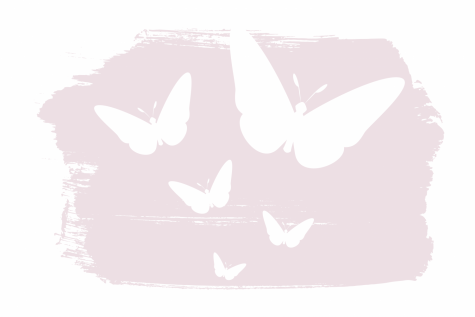Laughing over the casket: The twists and turns of grief
July 16, 2021

Editor’s note: This article is one in a series of stories from the Communication Department’s award-winning Echo magazine, featured this summer on the Chronicle site.
_____________________________________
It seemed to me on the day of my father’s funeral the worst thing that happened was I lost the pink velvet rose from my dress to the choppy waters of the funeral home toilet.
I only remember a few other details from that day, but I remember weeping over that insignificant accessory. I remember gleefully playing my favorite card game with my grandfather in the funeral home basement. I remember being surprised that my mother was there because my parents had already broken up. I remember thinking so hard about leaving one of my top three favorite stuffed kittens in the coffin but deciding against it in the end.
All of this occurred when I was 6 years old, and in the 16 years since then, the grief that I felt has traveled with me and manifested in different ways, at different moments. If you are one of the millions of people who have lost someone this past year, think of this article as my sympathy card to you, and take this to heart when I tell you that whatever you are experiencing, you are not alone.
I am a member of several large families that sprouted from my great-grandparents, so while I wouldn’t say I’m an expert in death, I would say I know my local funeral home better than some people in my hometown — and each death has been different.
“In the relationships that people have in their lives, it’s very different how they process the loss,” says Lizzette Arcos, psychotherapist at Youth & Family Counseling. “Something that has come into play with the loss is also different cultural aspects.”
At the funeral of one of my uncles, a few of his sisters got up and did a conga line, and at another’s we all wore Cubs memorabilia and wept. After one great-grandmother’s passing, a few of her nieces and friends said the rosary in Spanish at her casket for an hour, and later, a mariachi played at her burial in the bright summer sunlight — while after another great-grandmother’s passing, I helped collect her belongings from her room at the nursing home while she was still there, insisting that I was desensitized to death.
The twists and shifts each of these griefs have taken over the years are baffling and hard to catch up with. During the 10-year anniversary of my father’s death, I hated myself and everything around me, and I cried at the drop of a hat. But the year after, I made my @deaddadjokesbyme Tumblr and embraced the dark humor I found in the situation.
After my great-grandmother passed away, I was cracking jokes until they lowered her into the ground. At that moment, I saw one of my toddler cousins chasing a monarch, and it sent me weeping into my older cousin’s arms.
The turns grief can take can happen in a matter of years or a matter of hours — and they can blend, too.
“One loss, especially early losses, are reactivated or reanimated in other losses that come later in life — even a more ambiguous loss,” says Jenna White, psychotherapist at Depth Counseling. “[The pandemic] was really regressive for a lot of us. It made us go back to earlier chapters in our lives. Maybe it reminded us of being stuck in our houses as kids and feeling really powerless, or, certainly, experiencing loss of loved ones is bound up in earlier losses. It can be quite stunning, actually, how reactivated and reanimated that grief is.”
Genuinely, the last thing I want you to see here is a sob story about my life. What I need you to find is a normalization of your feelings, despite the fact that there is no “normal” grief.
“Grief is kind of like a wild animal — a cornered wild animal,” White says. “There is a feral-ness, a primitiveness, where we are put in touch with our humanity in such a bone-rattling kind of way that the world as we know it is changed, sometimes in an instant. If there is anything normal about it, it’s that it’s different for everyone.”
Arcos says not one of her clients has dealt with grief in the same exact way as another. Something I used to say to people who had just experienced a death when I thought I was completely desensitized to the experience was “It’ll get better.” But sometimes it will, and sometimes it won’t.
“We want to achieve acceptance, but the person may start at depression and want to be angry and move into bargaining and then denial again and go back to depression and finally get to acceptance,” Arcos says. “And it’s all natural, and it’s all OK to feel this way.”
The only way I would say you should handle grief is by recognizing it. Take a moment to think about how you feel when you think you might be grieving and work through those feelings by finding what specifically is making you feel overwhelmed or helpless or whatever you may be feeling.
I’ve had a lot of sleepless nights and a lot of teary days, but I’ve also had a lot of joyous memories at funerals and a lot of fun talking about those who have passed. You retain power over your grief when you realize it wasn’t the velvet rose you were crying about.







